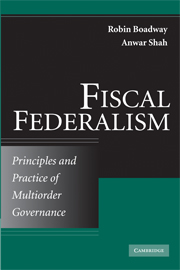Book contents
- Frontmatter
- Contents
- Preface
- PART ONE DESIGNING FISCAL CONSTITUTIONS
- PART TWO REVENUE SHARING AND FISCAL TRANSFERS
- PART THREE FINANCE AND PROVISION OF PUBLIC SERVICES
- PART FOUR CHALLENGES AND RESPONSES
- 14 Fiscal Federalism and Macroeconomic Governance
- 15 Interregional Competition and Policies for Regional Cohesion and Convergence
- 16 Decentralized Governance and Corruption
- 17 Adapting to a Changing World
- References
- Index
16 - Decentralized Governance and Corruption
Published online by Cambridge University Press: 05 June 2012
- Frontmatter
- Contents
- Preface
- PART ONE DESIGNING FISCAL CONSTITUTIONS
- PART TWO REVENUE SHARING AND FISCAL TRANSFERS
- PART THREE FINANCE AND PROVISION OF PUBLIC SERVICES
- PART FOUR CHALLENGES AND RESPONSES
- 14 Fiscal Federalism and Macroeconomic Governance
- 15 Interregional Competition and Policies for Regional Cohesion and Convergence
- 16 Decentralized Governance and Corruption
- 17 Adapting to a Changing World
- References
- Index
Summary
In their quest for responsive, responsible, and accountable public governance, numerous countries have recently taken steps to reexamine the roles of their various levels of government. This reexamination has resulted in a silent revolution sweeping the globe that is slowly but gradually bringing about rearrangements that embody diverse features of supranationalization, confederalization, centralization, provincialization, and localization. Note that localization implies home rule – that is, decision making and accountability for local services at the local level. Fundamental elements of home rule are local political autonomy (the ability of elected officials to be accountable to local residents), local administrative autonomy (the ability of local officials to hire and fire local government employees), and local fiscal autonomy (the discretionary ability to raise revenues and authority and flexibility in the use of local resources). The vision of a governance structure that is slowly taking hold through this silent revolution indicates either a gradual shift from unitary constitutional structures to federal or confederal governance for a large majority of people or strengthening local governance under a unitary form of government (twenty-nine federal or quasi-federal and twenty decentralized unitary countries with a combined total of about two-thirds of world population). This trend is a current source of concern among academic and policy circles, worried that localization may adversely affect the quality of public governance through an increase in the incidence of corruption.
This chapter examines the conceptual and empirical basis of these concerns.
- Type
- Chapter
- Information
- Fiscal FederalismPrinciples and Practice of Multiorder Governance, pp. 517 - 537Publisher: Cambridge University PressPrint publication year: 2009



